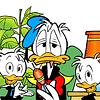Take a photo of a barcode or cover
adventurous
challenging
emotional
hopeful
inspiring
mysterious
reflective
sad
tense
slow-paced
Plot or Character Driven:
A mix
Strong character development:
Complicated
Loveable characters:
Complicated
Diverse cast of characters:
Yes
Flaws of characters a main focus:
No
A good ending to the series. More character focussed than the last two, with significantly less politics and subterfuge, and Reynolds tries his hand at developing characters - he has certainly improved significantly, but characters don't develop significantly throughout the course of the novel, and end up reasonably predictable - standard Reynolds fare, but improved in some ways.
The world building and scifi components are excellent, and cap the series off neatly.
The world building and scifi components are excellent, and cap the series off neatly.
his dystopian stuff is so much better than this...
I really loved this trilogy, it might be my all time favorite. The break from eurocentrism in the first book followed a break from androcentrism in the sequels created interesting aspects of world building. It had a good pacing, a lot more quiet and thoughtful than a lot of books, but I found it refreshing. I really enjoyed the utopian optimism, so much sci-fi is built on war and dystopianism, but the organic optimistic view carried through these books really set a different tone for a "potential future"
medium-paced
adventurous
challenging
emotional
hopeful
informative
mysterious
reflective
sad
tense
medium-paced
Plot or Character Driven:
Character
Strong character development:
Yes
Loveable characters:
Yes
Diverse cast of characters:
Yes
Flaws of characters a main focus:
Complicated
I absolutely loved this series. Each book just got better. I was saddened to come to the end, an unavoidable inevitability.
The entire story is, as usual with Reynolds, an epic, spanning generations. Inevitably this led to characters departing from the story, which was also quite affecting. But this allowed it to instil in me a sense of wonder at the scope. It also continually surprised me with events, something I enjoyed immensely.
I'd love to read more in this setting.
The entire story is, as usual with Reynolds, an epic, spanning generations. Inevitably this led to characters departing from the story, which was also quite affecting. But this allowed it to instil in me a sense of wonder at the scope. It also continually surprised me with events, something I enjoyed immensely.
I'd love to read more in this setting.
I missed something vital in the first or second book that made this difficult to follow. I will finish it someday!
Having followed Alastair Reynolds' books since I bought Revelation Space from the Charing Cross Rd. Borders back in 2001, I was a bit let down by Poseidon's Wake. As the third book in Poseidon's Children, I was expecting some grand concepts, big reveals and thought-provoking mysteries. Instead, the book dwells on character relationships and motivations on a backdrop that is, without a doubt, fantastic, but has in my opinion been left mostly unexplored and underutilized.
The character's motivations appear inconsistent. Why embark on a 100+ year journey ostensibly to find knowledge to then shy away from actually getting it out of some ill-founded existential fear? Goma's misgivings about Peter Graves and the other "religious fundamentalists" feel ironic once they reach Gliese 163 and the once rational no-nonsense "let's explore what is out there" characters are the first to refuse to do so, to the point of violence. Not that, once they actually get to Poseidon, they actually learn anything of real value.
Furthermore the Terror was unconvincing. Taken as granted the universe will eventually end, knowing it may do so sooner rather than later isn't reason enough to lead characters to despair and the verge of suicide. Everyday actions still have measurable effects over the span of centuries and millennia. Existence is not bleak.
Alastair Reynolds has accustomed us to exciting books full of great concepts. This book falls short of that. It is not, by any means, a bad book, but feels mired in a weird "let's show characters aren't two-dimensional" soap opera hell. Stripped down to the interesting bits, a better paced story could have been written in far fewer pages.
The character's motivations appear inconsistent. Why embark on a 100+ year journey ostensibly to find knowledge to then shy away from actually getting it out of some ill-founded existential fear? Goma's misgivings about Peter Graves and the other "religious fundamentalists" feel ironic once they reach Gliese 163 and the once rational no-nonsense "let's explore what is out there" characters are the first to refuse to do so, to the point of violence. Not that, once they actually get to Poseidon, they actually learn anything of real value.
Furthermore the Terror was unconvincing. Taken as granted the universe will eventually end, knowing it may do so sooner rather than later isn't reason enough to lead characters to despair and the verge of suicide. Everyday actions still have measurable effects over the span of centuries and millennia. Existence is not bleak.
Alastair Reynolds has accustomed us to exciting books full of great concepts. This book falls short of that. It is not, by any means, a bad book, but feels mired in a weird "let's show characters aren't two-dimensional" soap opera hell. Stripped down to the interesting bits, a better paced story could have been written in far fewer pages.
It's funny but, after uplifted dolphins and intelligent apes (there are probably more examples that I can't remember), Risen elephants seemed slightly amusing to me. Not so much as a concept - I had accepted the idea in the previous book in this trilogy - but more so for that fact that, in this one, they donned spacesuits. I don't know what it was about that simple part of the story, but it didn't ring true.
Elsewhere, Reynolds brings this trilogy to a close in a more than satisfactory manner. Space Opera, big dumb (and not so dumb) objects, an interesting cast, big ideas - all combine juts as entertainingly as in his other books. There's a rescue set-piece towards the end of the book that is deliberately less than breathtaking in its slowness, but it's the idea behind the Terror that did it for me. Without giving anything away, in one description Reynolds managed to depress me and make me feel both insignificant and futile. Then, just a few pages later, reversed that in a very clever manner.
Much like Clarke's Rendezvous With Rama, this book doesn't answer all its own questions. Things are left very open. But, whereas Clarke's book was (originally, anyway) a stand-alone and those answers were provided by extending it into a series that explained everything, Poseidon's Wake is the end of a trilogy and I can't help but wonder whether he will revisit the characters or, perhaps, the aliens hinted at in it at a later time.
Elsewhere, Reynolds brings this trilogy to a close in a more than satisfactory manner. Space Opera, big dumb (and not so dumb) objects, an interesting cast, big ideas - all combine juts as entertainingly as in his other books. There's a rescue set-piece towards the end of the book that is deliberately less than breathtaking in its slowness, but it's the idea behind the Terror that did it for me. Without giving anything away, in one description Reynolds managed to depress me and make me feel both insignificant and futile. Then, just a few pages later, reversed that in a very clever manner.
Much like Clarke's Rendezvous With Rama, this book doesn't answer all its own questions. Things are left very open. But, whereas Clarke's book was (originally, anyway) a stand-alone and those answers were provided by extending it into a series that explained everything, Poseidon's Wake is the end of a trilogy and I can't help but wonder whether he will revisit the characters or, perhaps, the aliens hinted at in it at a later time.




